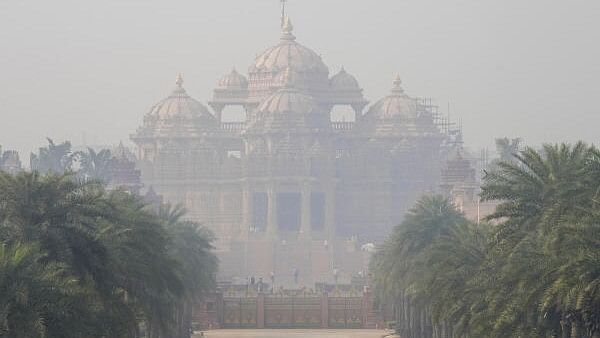
Smog in Delhi
Credit: PTI Photo
New Delhi: The Supreme Court on Friday said it will consider on November 25 whether or not to ease restrictions against the backdrop of improvement in the air quality index (AQI) levels as anti-air pollution GRAP-4 restrictions will remain in force for Delhi-NCR for the next 72 hours.
A bench of Justices Abhay S Oka and Augustine George Masih expressed displeasure over the "poor implementation" of GRAP-4 restrictions, especially related to restricting entry of trucks carrying non-essential goods into Delhi.
The bench pulled up the Delhi government for failing to ensure that trucks registered outside the state do not enter the capital as a petitioner’s counsel claimed that truck drivers usually pay bribes to gain entry in the capital.
The court said that there should be a complete ban on entry of trucks, registered outside Delhi, strictly at all 113 entry points. The bench was informed that checking only happened at 13 main points, and the trucks entered through the remaining 110 points.
"Tell us how you (the Delhi government) are stopping entry of trucks. We want a team of experts to monitor entry of trucks into the NCR and then we will take a call,” the bench said.
The court directed the Centre and the Delhi Police to ensure setting up of check posts at all 113 entry points, and also install CCTV cameras at these points.
It also appointed 13 Supreme Court lawyers as court commissioners to visit the various entry points in Delhi to ascertain whether restrictions on entry of trucks were implemented or not.
The bench said it will consider on Monday whether GRAP-4 can be brought down to GRAP-2. Under stage two of the GRAP or the Graded Response Action Plan, there will be restrictions on the use of coal and firewood as well as diesel generator sets in the Delhi-National Capital Region (NCR). Stage 4 of the GRAP is implemented when the AQI in Delhi reaches the severe-plus category, which is when it crosses 450.
The measures undertaken under GRAP-4 include stopping entry of trucks into Delhi, ban on construction and demolition activities for linear public projects such as highways, roads, flyovers, overbridges, power transmission, pipelines, telecommunication, etc. The government can also discontinue physical classes.
The bench said it is very well aware of the consequences of GRAP-4, which are serious as they affect various sectors.
Additional solicitor general Aishwarya Bhati, representing the Centre, said that the pollution level has dropped in the last two days and the AQI level was now under the GRAP-2 stage.
The bench was informed that due to its direction, GRAP-4 has not been withdrawn. The counsel said to withdraw GRAP-4, court’s permission is required and added, “We haven’t withdrawn GRAP-4”.
"The consequences of GRAP-4 are drastic and it will have adverse effects on several sections of the society," the bench said.
Meanwhile, the Centre vehemently opposed a proposal to form a committee of former apex court judges to oversee the implementation of measures against stubble burning, a key contributor to Delhi-NCR's air pollution, saying that the government and the Commission for Air Quality Management (CAQM) were taking adequate measures and “no judicial application of mind is required”.
Senior advocate and amicus curiae Aparajita Singh sought to leverage the expertise of judges as part of the proposed fact-finding committee and emphasised that they had previously dealt with air pollution and stubble burning issues.
Singh said, “I had suggested on the last occasion that let it go to CAQM but CAQM data itself is not inspiring today. What I suggested on the last occasion was four judges’ who had vigorously monitored these matters. The court may make a committee of these judges’, they know the issue. They have monitored the issue. Let them hear each and every individual, the farmers, and the government”.
Additional solicitor general Aishwarya Bhati, representing the Centre, shot back saying, “We are strongly opposing (this committee)”.
Senior advocate Gopal Sankaranarayanan, representing a party in the matter, said “We are strongly supporting it…we have seen after the CAQM came in…”.
Bhati said, “We are here, the statutory framework is here, all state governments are here. Each of the agencies are here….We are acting on the suggestions”.
Sankaranarayanan said the resistance shows what the problem is. Bhati said we are respectfully submitting, “Please do not create any more tier.” Singh said it is not a tier but a fact-finding committee, which will report to the court.
Bhati asserted that the Centre and the air quality commission were taking adequate measures and that adding another oversight layer would be counterproductive.
In 2020, a bench headed by the then CJI Justice S A Bobde set up a panel headed by Justice M B Lokur to deal with the issues relating to stubble burning. The order was later recalled after the Commission for Air Quality Management (CAQM) came into existence.
The court was informed that the burnt area in Punjab has increased to 19.1 lakh hectare from 15.1 lakh hectare in 2021, a 24 per cent rise, and Haryana's burnt area rose from 3.5 lakh hectare in 2021 to 8.3 lakh hectare in 2023.
It was argued before the court that this contrasts with CAQM data, which claims a reduction in farm fires in Haryana.
The ASG defended the CAQM's methodology, arguing that reliance on unverified sensors would undermine the process.
The bench observed that while satellites could detect farm fires, burnt areas showed their exact extent.
The court had earlier directed the Centre and the CAQM to procure farm fire data using geostationary satellites, as opposed to NASA's polar-orbiting satellites, to ensure real-time monitoring.
